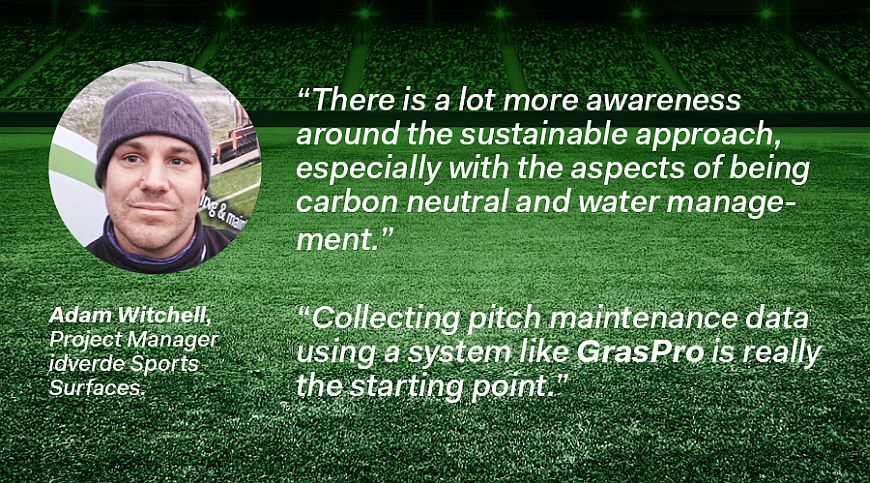Data a crucial factor for sustainable and carbon neutral turf maintenance
The awareness of sustainable and carbon-neutral turf maintenance is growing within the industry, and for those implementing this approach, data collection using GrasPro is a crucial factor.
Sustainability in terms of sports turf has direct environmental benefits, and in many cases, professionals can improve the condition of surfaces and reduce budgetary spend on water, electricity and fertiliser while lowering the wider carbon footprint of their club or course.
Adam Witchell, Project Manager for idverde Sports Surfaces, formally worked at Forest Green Rovers FC where he operated a vegan, organic programme. While this approach is at the far end of the philosophy, data collection was vital in fine-tuning his method. He believes that it is and will continue to be a fundamental aspect of sustainable turf maintenance programmes as we advance.
“There is a lot more awareness around the sustainable approach, especially with the aspects of being carbon neutral and water management,” Adam explains. “There are a lot of ways to achieve it but collecting pitch maintenance data using a system like GrasPro is really the starting point because you need to know your infiltration rates at different times of the year, soil temperatures, rainfall and nutrient inputs etc.
“With that information to hand you then know how much water to put on at certain times of the year, and it prevents over and under-watering. The benefits here are three-fold because you’re leaving more air pockets within the soil for the roots to develop and you’re not wasting water and making your irrigation programme more sustainable. If you’re running off of mains water, you’re also saving money, and for many football, rugby and golf clubs that is a finite resource.
“If you have a lot of rain and it flies through the pitch really fast, and you put a granular feed on you’ll find you won’t get as much usage or longevity out of that feed because the water will wash it through the soil profile or wash the prill down in size much quicker. A lot of that will end up being leached into your drainage and will be lost and not taken up through the roots so of no benefit to the plant. Knowing how your profile is likely to react in different seasons and conditions, means you can better manage that application and bring it forward or move it back to get the most out of it. But being able to do that starts with data.”
While this approach may be new to some, there are already strong examples Adam points to in the industry. Stoke City FC Head Groundsman, Andy Jackson, has maintained the Bet365 Stadium pitch without fungicides for six years, and a sustainability league table published by BBC Sport at the end of January 2021 saw Tottenham Hotspur come first based on several initiatives including water efficiency, energy efficiency and clean energy.
BBC Sport and the Sports Positive Summit first published the table in 2019, and while it focuses on clubs as a whole, Adam points out that pitch teams have a head start in making their department’s carbon neutral.
The pitch itself sucks in CO2 and creates oxygen, so you’re starting on a plus side if you can get a pitch with 100% grass coverage,” Adam explains. You’re then making oxygen yourself, and you can use that as a buffer for how much carbon you produce when maintaining the pitch, and if recorded and planned correctly, you can make your department carbon neutral.
– Adam Witchell, Project Manager for idverde Sports Surfaces
“This approach scales up if you’re maintaining multiple pitches at a training ground because you’re producing more oxygen. It’s quite a simple thing to implement, but again it’s recording the data and knowing your emissions that is important.”
If you’re aiming to make your department carbon neutral or strive to work more sustainably, GrasPro is the perfect system to record, manage and report your data.
Start your data journey now!
Leave your contact details to find out more.


